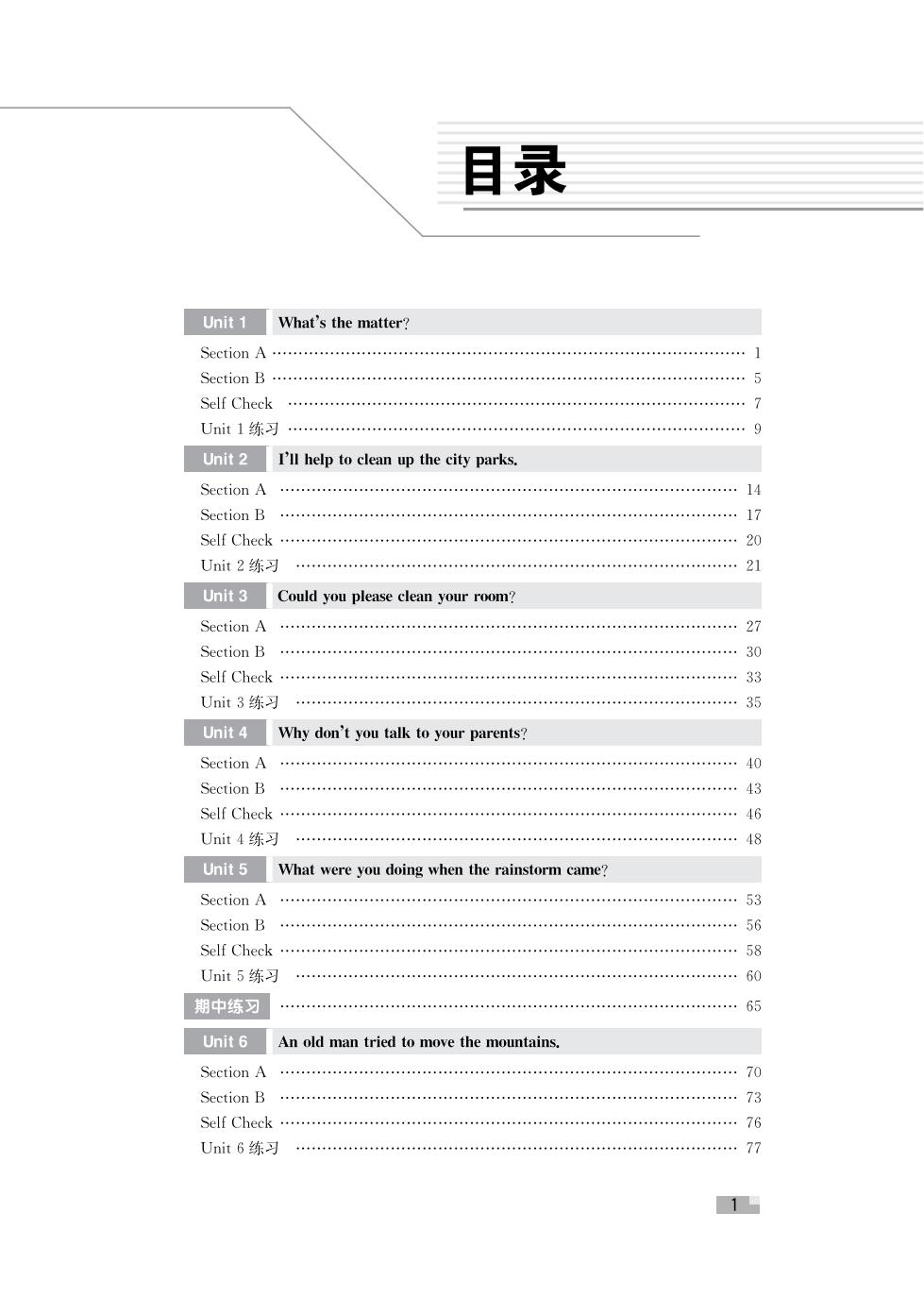
目录 Unit1 What's the matter? Section A ee。] Section B Self Check 7 Unit1练习 +++ Unit 2 I'll help to clean up the city parks. Section A 14 Section B 17 Self Check 20 Unit2练习 21 Unit3 Could you please clean your room? Section A 27 Section B 30 Self Check 33 Unit3练习 35 Unit 4 Why don't you talk to your parents? Section A 小… 40 Section B 43 Self Check 46 Unit4练习 *4……*………44… 48 Unit 5 What were you doing when the rainstorm came? Section A 53 Section B ++小++*…++…*……+4+44++++4++…+小+44…+… 56 Self Check 58 Unit5练习 60 期中练习 65 Unit 6 An old man tried to move the mountains. Section A 0 Section B ee E EE E EEeEEEEEEE E EeE E EEEEEEEE 73 Self Check … 76 Unit6练习 77 1
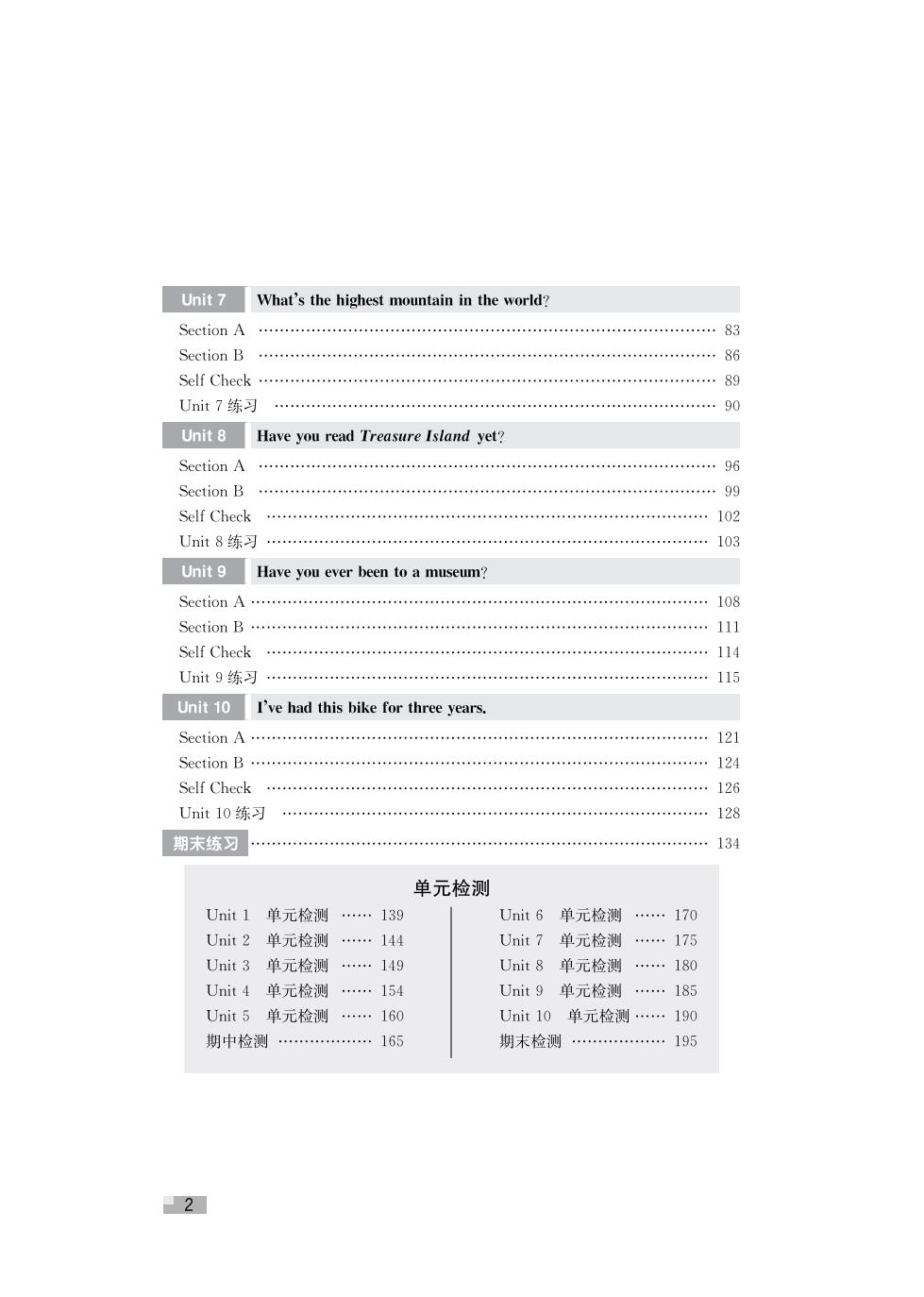
Unit 7 What's the highest mountain in the world? Section A 83 Section B 86 Self Check g Unit7练习 90 Unit 8 Have you read Treasure Island yet? Section A … 96 Section B 99 Self Check 102 Unit8练习 …… 103 Unit9 Have you ever been to a museum? Sectic0nA… 108 Sectic0nB…… 111 Self Check 114 Unit9练习 …115 Unit 10 I've had this bike for three years. Section A 121 Sectic0nB… 124 Self Check 126 Unit10练习 128 期末练习 +t+t+ 134 单元检测 Unit1单元检测 …139 Unit6单元检测…170 Unit2单元检测…144 Unit7单元检测 …175 Unit3单元检测 …149 Unit8单元检测 …180 Unit4单元检测…154 Unit9单元检测 …185 Unit5单元检测 …160 Unit10单元检测…190 期中检测 …165 期末检测 …195 2
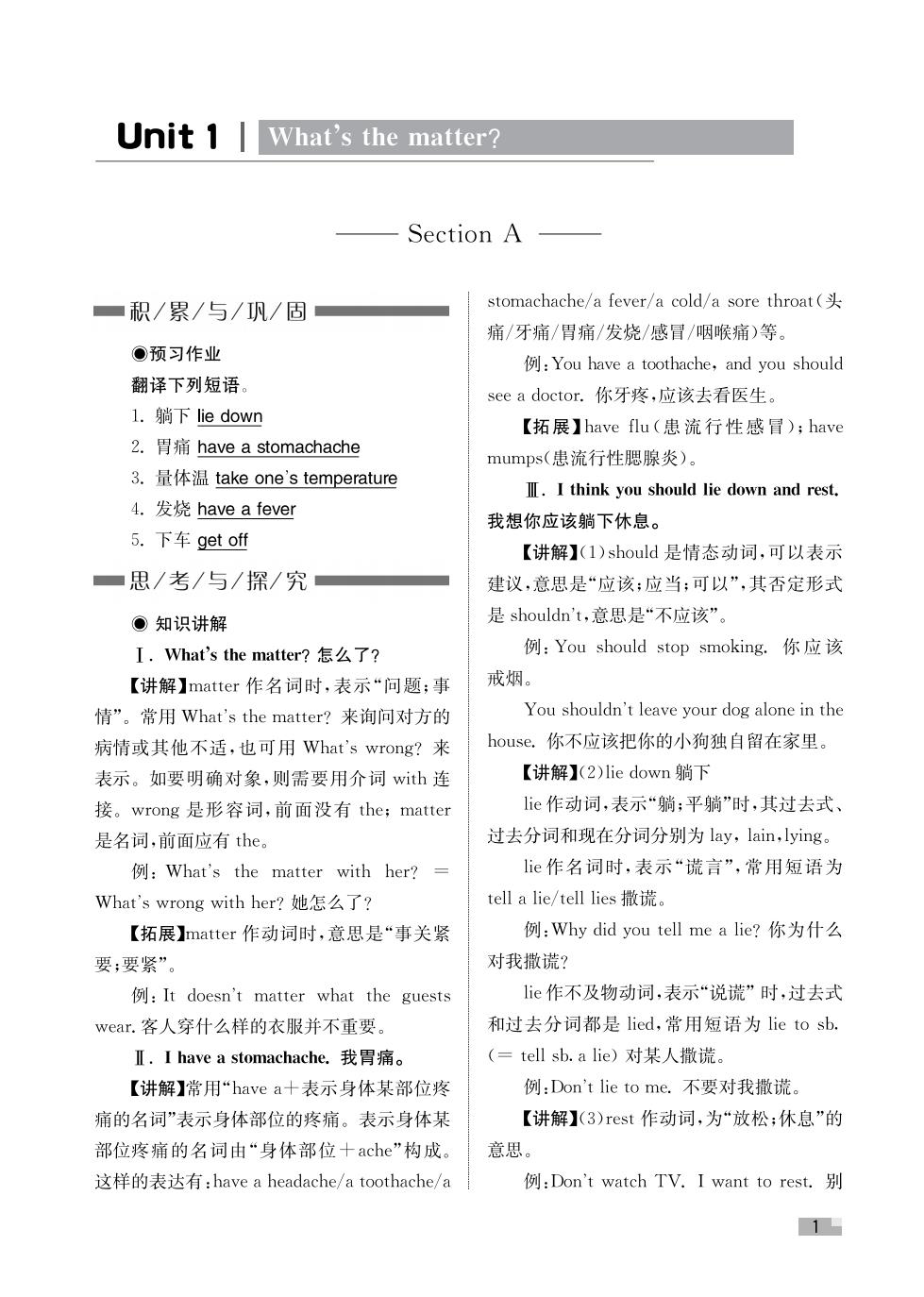
Unit1 What's the matter? Section A ■积/累/与/巩/固 stomachache/a fever/a cold/a sore throat 痛/牙痛/胃痛/发烧/感冒/咽喉痛)等。 。预习作业 例:You have a toothache,and you should 翻译下列短语。 see a doctor.你牙疼,应该去看医生。 l.躺下lie down 【拓展】have flu(患流行性感冒);have 2.胃痛have a stomachache mumps(患流行性腮腺炎)。 3.量体温take one's temperature II.I think you should lie down and rest. 4.发烧have a fever 我想你应该躺下休息。 5.下车get off 【讲解】(1)should是情态动词,可以表示 ■思/考/与/探/究 建议,意思是“应该;应当:可以”,其否定形式 ○知识讲解 是shouldn't,意思是“不应该”。 I.What's the matter?怎么了? 例:You should stop smoking.你应该 【讲解】matter作名词时,表示“问题;事 戒烟。 情”。常用What's the matter?来询问对方的 You shouldn't leave your dog alone in the 病情或其他不适,也可用What's wrong?来 house.你不应该把你的小狗独自留在家里。 表示。如要明确对象,则需要用介词with连 【讲解】(2)lie down躺下 接。wrong是形容词,前面没有the;matter lie作动词,表示“躺;平躺”时,其过去式、 是名词,前面应有the。 过去分词和现在分词分别为lay,lain,lying。 例:What's the matter with her?= lie作名词时,表示“谎言”,常用短语为 What's wrong with her?她怎么了? tell a lie/tell lies撒谎。 【拓展】matter作动词时,意思是“事关紧 例:Why did you tell me a lie?你为什么 要;要紧”。 对我撒谎? 例:It doesn't matter what the guests lie作不及物动词,表示“说谎”时,过去式 wear.客人穿什么样的衣服并不重要。 和过去分词都是lied,常用短语为lie to sb. lⅡ.I have a stomachache.我胃痛。 (=tell sb.alie)对某人撒谎: 【讲解】常用“have a十表示身体某部位疼 例:Don't lie to me.不要对我撒谎。 痛的名词”表示身体部位的疼痛。表示身体某 【讲解】(3)rest作动词,为“放松;休息”的 部位疼痛的名词由“身体部位十ache”构成。 意思。 这样的表达有:have a headache/,a toothache,/a 例:Don't watch TV.I want to rest.别 1
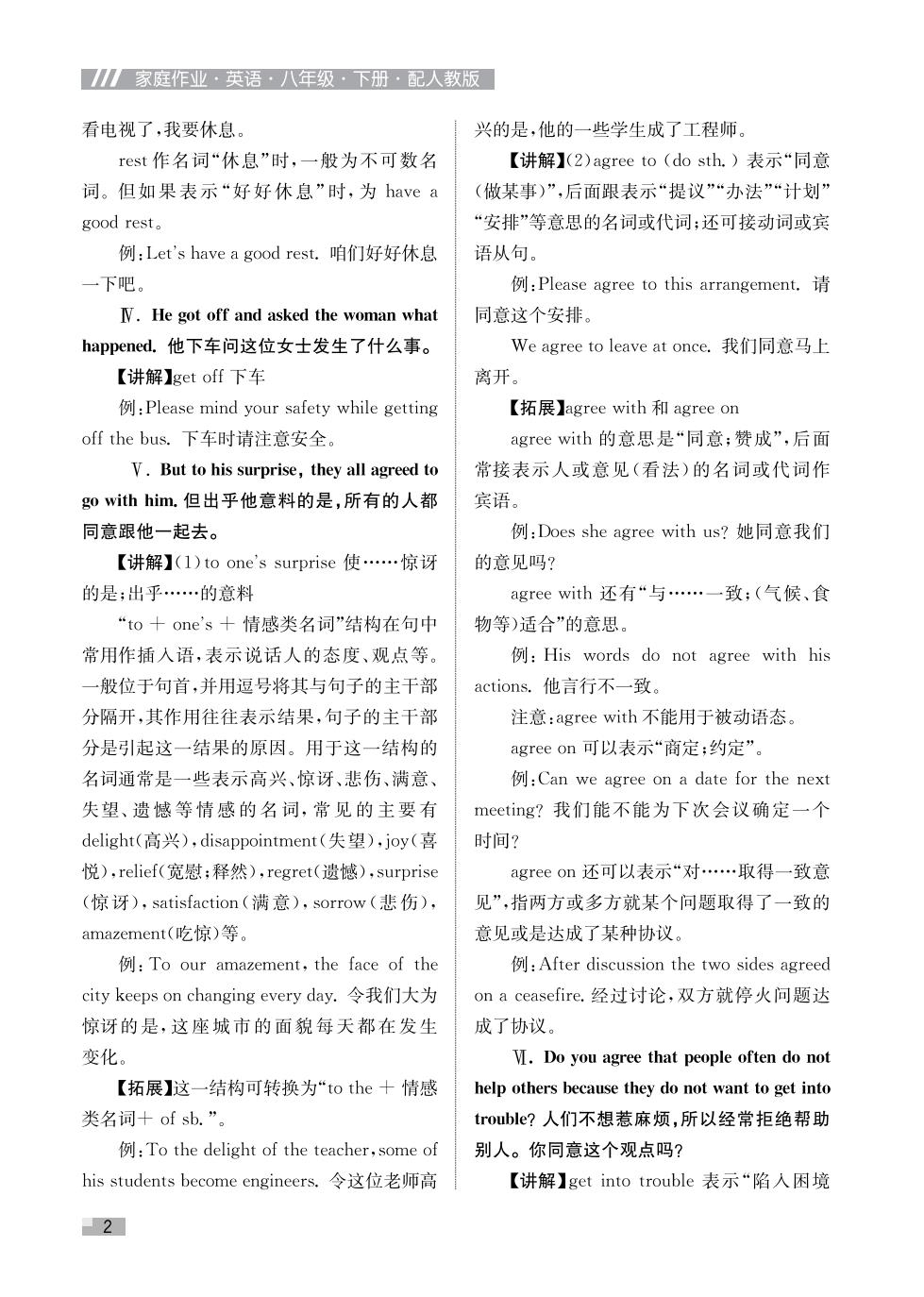
家庭作业·英语·八年级·下册·配人数版 看电视了,我要休息。 兴的是,他的一些学生成了工程师 rest作名词“休息”时,一般为不可数名 【讲解】(2)agree to(do sth.)表示“同意 词。但如果表示“好好休息”时,为have a (做某事)”,后面跟表示“提议”“办法”“计划” good rest. “安排”等意思的名词或代词;还可接动词或宾 例:Let's have a good rest.咱们好好休息 语从句。 一下吧。 例:Please agree to this arrangement,请 V.He got off and asked the woman what 同意这个安排。 happened.,他下车问这位女士发生了什么事。 We agree to leave at once.我们同意马上 【讲解】get off下车 离开。 例:Please mind your safety while getting 【拓展】agree with和agree on off the bus.下车时请注意安全。 agree with的意思是“同意;赞成”,后面 V.But to his surprise,they all agreed to 常接表示人或意见(看法)的名词或代词作 go with him.但出乎他意料的是,所有的人都 宾语。 同意跟他一起去。 例:Does she agree with us?她同意我们 【讲解】(l)to one's surprise使…惊讶 的意见吗? 的是;出乎…的意料 agree with还有“与…一致;(气候、食 “to十one's十情感类名词”结构在句中 物等)适合”的意思。 常用作插入语,表示说话人的态度、观点等。 例:His words do not agree with his 般位于句首,并用逗号将其与句子的主干部 actions.他言行不一致: 分隔开,其作用往往表示结果,句子的主干部 注意:agree with不能用于被动语态。 分是引起这一结果的原因。用于这一结构的 agree on可以表示“商定;约定”。 名词通常是一些表示高兴、惊讶、悲伤、满意、 例:Can we agree on a date for the next 失望、遗憾等情感的名词,常见的主要有 meeting?我们能不能为下次会议确定一个 delight(高兴),disappointment(失望),joy(喜 时间? 悦),relief(宽慰;释然),regret(遗憾),surprise agree on还可以表示“对…取得一致意 (惊讶),satisfaction(满意),sorrow(悲伤), 见”,指两方或多方就某个问题取得了一致的 amazement(吃惊)等。 意见或是达成了某种协议。 例:To our amazement,the face of the 例:After discussion the two sides agreed city keeps on changing every day.令我们大为 on a ceasefire,经过讨论,双方就停火问题达 惊讶的是,这座城市的面貌每天在发生 成了协议。 变化。 MI.Do you agree that people often do not 【拓展】这一结构可转换为“to the十情感 help others because they do not want to get into 类名词十ofsb.”。 trouble?人们不想惹麻烦,所以经常拒绝帮助 例:To the delight of the teacher,some of 别人。你同意这个观点吗? his students become engineers.令这位老师高 【讲解】get into trouble表示“陷入困境 2
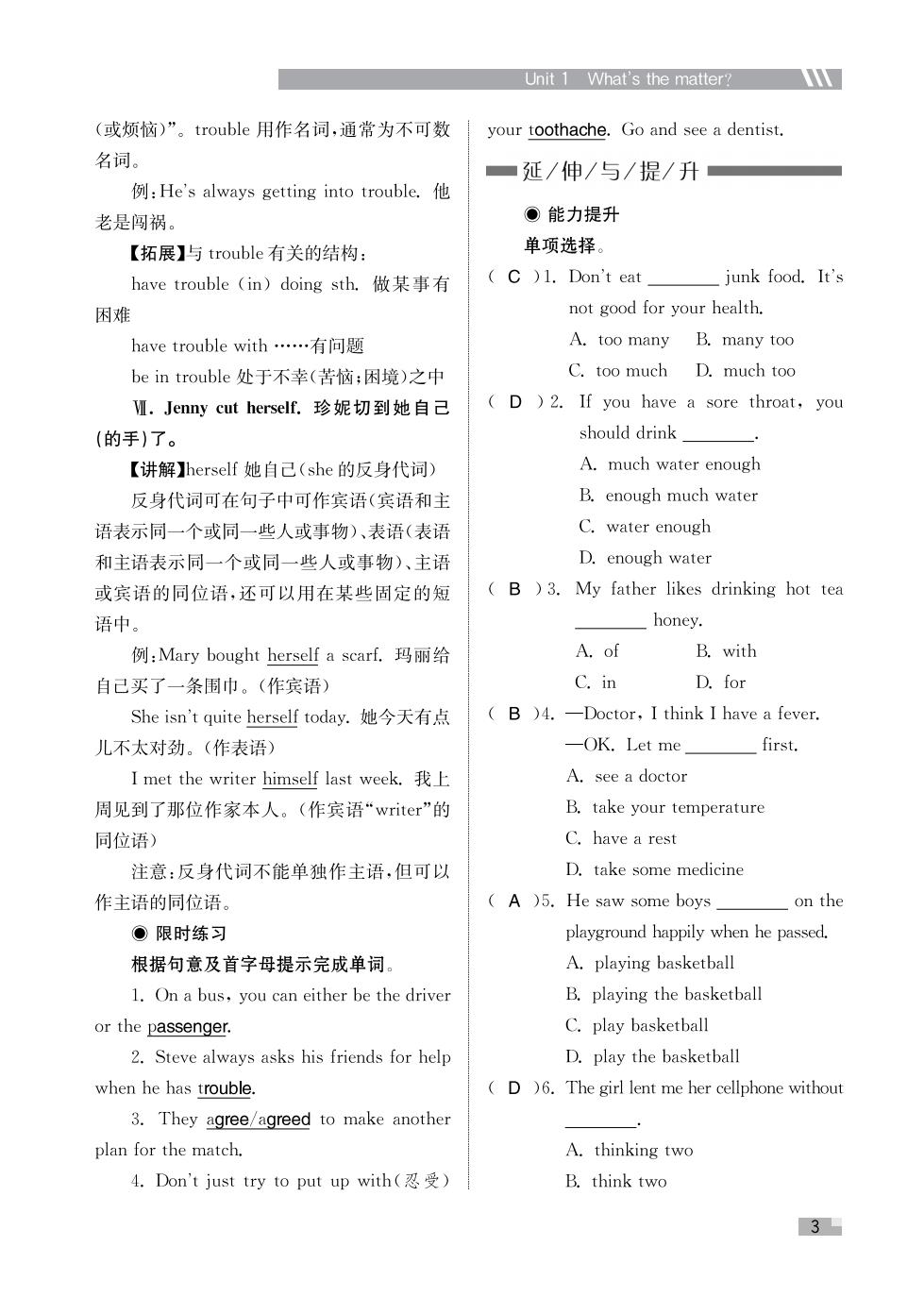
Unit 1 What's the matter? (或烦恼)”。trouble用作名词,通常为不可数 your toothache.Go and see a dentist. 名词。 ■延/伸/与/提/升 例:He's always getting into trouble,他 老是闯祸。 O能力提升 【拓展】与trouble有关的结构: 单项选择。 have trouble(in)doing sth.做某事有 (C)1.Don't eat junk food.It's 困难 not good for your health have trouble with…有问题 A.too many B.many too be in trouble处于不幸(苦恼;困境)之中 C.too much D.much too I.Jenny cut herself..珍妮切到她自己 ( D )2.If you have a sore throat,you (的手)了。 should drink 【讲解】herself她自己(she的反身代词) A.much water enough 反身代词可在句子中可作宾语(宾语和主 B.enough much water 语表示同一个或同一些人或事物)、表语(表语 C.water enough 和主语表示同一个或同一些人或事物)、主语 D.enough water 或宾语的同位语,还可以用在某些固定的短 )3.My father likes drinking hot tea 语中。 honey. 例:Mary bought herself a scarf..玛丽给 A.of B.with 自己买了一条围巾。(作宾语) C.in D.for She isn't quite herself today.她今天有点 (B )4.-Doctor,I think I have a fever. 儿不太对劲。(作表语) -OK.Let me first. I met the writer himself last week.我上 A.see a doctor 周见到了那位作家本人。(作宾语“writer”的 B.take your temperature 同位语) C.have a rest 注意:反身代词不能单独作主语,但可以 D.take some medicine 作主语的同位语。 A )5.He saw some boys on the ○限时练习 playground happily when he passed. 根据句意及首字母提示完成单词。 A.playing basketball 1.On a bus,you can either be the driver B.playing the basketball or the passenger. C.play basketball 2.Steve always asks his friends for help D.play the basketball when he has trouble D )6.The girl lent me her cellphone without 3.They agree/agreed to make another plan for the match. A.thinking two 4.Don't just try to put up with(忍受) B.think two 3